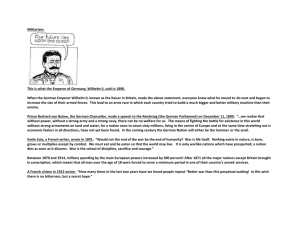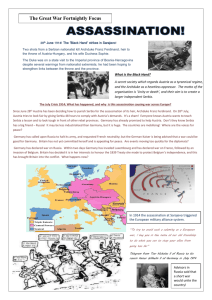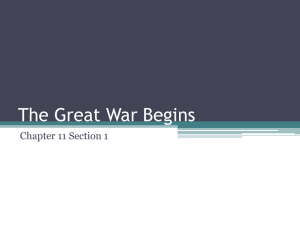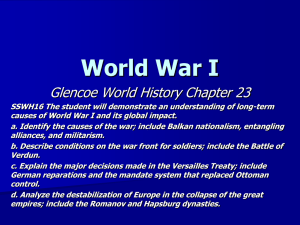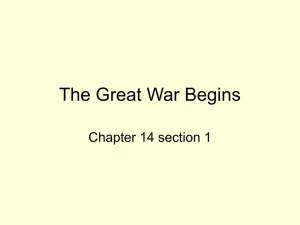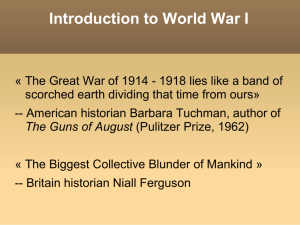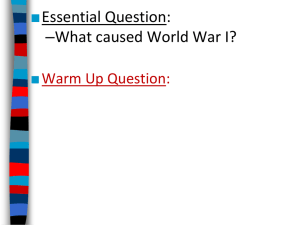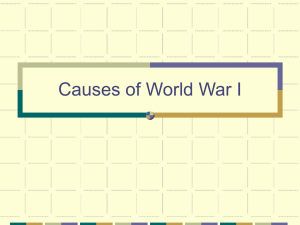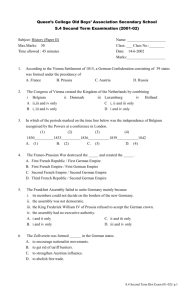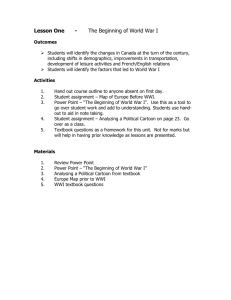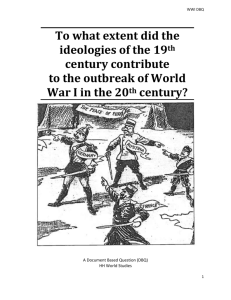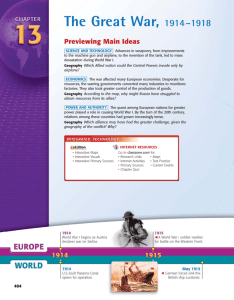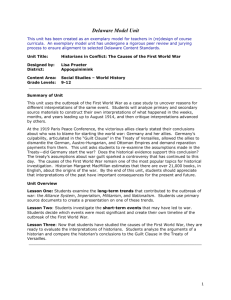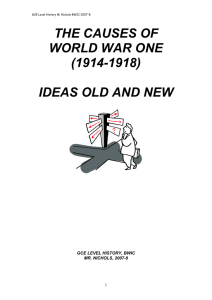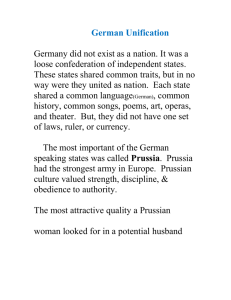Humanities II
advertisement
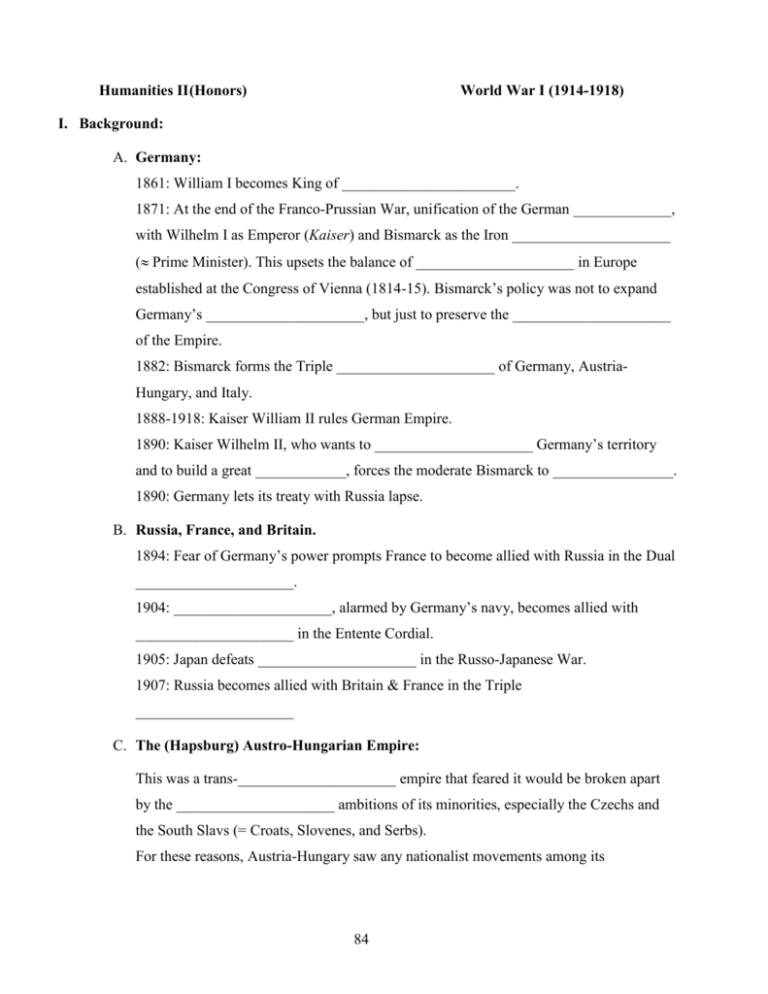
Humanities II (Honors) World War I (1914-1918) I. Background: A. Germany: 1861: William I becomes King of _______________________. 1871: At the end of the Franco-Prussian War, unification of the German _____________, with Wilhelm I as Emperor (Kaiser) and Bismarck as the Iron _____________________ ( Prime Minister). This upsets the balance of _____________________ in Europe established at the Congress of Vienna (1814-15). Bismarck’s policy was not to expand Germany’s _____________________, but just to preserve the _____________________ of the Empire. 1882: Bismarck forms the Triple _____________________ of Germany, AustriaHungary, and Italy. 1888-1918: Kaiser William II rules German Empire. 1890: Kaiser Wilhelm II, who wants to _____________________ Germany’s territory and to build a great ____________, forces the moderate Bismarck to ________________. 1890: Germany lets its treaty with Russia lapse. B. Russia, France, and Britain. 1894: Fear of Germany’s power prompts France to become allied with Russia in the Dual _____________________. 1904: _____________________, alarmed by Germany’s navy, becomes allied with _____________________ in the Entente Cordial. 1905: Japan defeats _____________________ in the Russo-Japanese War. 1907: Russia becomes allied with Britain & France in the Triple _____________________ C. The (Hapsburg) Austro-Hungarian Empire: This was a trans-_____________________ empire that feared it would be broken apart by the _____________________ ambitions of its minorities, especially the Czechs and the South Slavs (= Croats, Slovenes, and Serbs). For these reasons, Austria-Hungary saw any nationalist movements among its 84 _____________________ as a great threat to its own _____________________. Accordingly, it strove to brutally _____________________ any such movements. D. The Balkans (= the peninsula in southeastern Europe, bordering on the north with Austria and Hungary, on the west by the Adriatic Sea, on the south by the Aegean Sea, and on the east by the Black Sea): 1878: _____________________ Ottoman Empire abandons the Balkans (most of which it had ruled since 1459). 1905: Russia and Austria make a deal: - Turkey allows _____________________ warships to pass through the Dardanelles, the straits connecting _____________________’s Black Sea with the Mediterranean. - _____________________ annexes Bosnia and Herzegovina (= the South Slavs). 1908: Bosnian Crisis: Serbia opposes _____________________’s annexation of Bosnia and Herzegovina because of Serbia’s “Pan-Serbian” policy: it considers Bosnia and Herzegovina part of Great _____________________. 1912: First Balkan War: - The Balkan states (Montenegro, Serbia, Bulgaria, and Greece) attack the _____________________ Empire. - _____________________ gains the Albanian coast, and thus access to the Mediterranean. - Austria and Germany then force Serbia to give up _____________________. - _____________________ now agrees to back Serbia in any future conflict with _____________________. II. The Outbreak of War: A. The immediate causes of World War I: June 28, 1914: Archduke Franz Ferdinand, _____________________ of AustroHungarian Emperor Franz Joseph and _____________ to the throne of Austria-Hungary, visits Sarajevo, the capital of _____________________ (then part of Austria-Hungary). He and his wife are assassinated by Gavrilo Princip, a member of the pan-Serbian group “Young _____________________,” which advocated _____________________ 's unification with Serbia and was aided by the Serbian nationalist terrorist group “Unification or _____________________” (= the “_____________________ Hand”). 85 July 23, 1914: _____________________ gives Serbia an ultimatum: allow Austrian officials to enter Serbia to suppress elements hostile to Austria-Hungary or face _____________________. July 25, 1914: Serbia _____________________ the ultimatum. July 28, 1914: WWI begins when Austria declares _____________________ on Serbia, and _____________________ mobilizes against Austria. July 30, 1914: Pressured by Russian generals, Russia mobilizes also against _____________________. August 1, 1914: _____________________ declares war on Russia. August 3, 1914: Germany declares war on _____________________. August 4, 1914: Germany invades _____________________ on its way to France. _____________________ comes to Belgium’s aid and declares war on _____________________. B. At the beginning of WWI, Europeans were generally _____________________ about war. There are several reasons for this: - Europeans had forgotten the _____________________ of war. There had been no _____________________ European war for over 150 years (since the Seven Years’ War of 1756-1763). And there had been no _____________________ war at all in Europe for over a _____________________ (since the Franco-Prussian War of 1870-71). - _____________________ inspired the patriotic desire to become a national _____________________ by giving one’s life for one’s country. Beginning with the First French Republic, national _____________________ claimed to protect not just an individual _____________________, but universal _____________________. - _____________________ valued the all-out passion of battle as a _____________________ calling, superior the dull _____________________ of business, bureaucracy, _____________________, and technology. III. The war drags on: A. The Western Front: Germany and French forces dug _____________________ along their border, separated by a “________ _____________’s land.” _____________________ -gun emplacements made attacks into suicide. 86 February 1915: _____________________ attacks the ancient French fortress of Verdun. Over _____________________ soldiers are killed, and Germany was forced to retreat. July –November 1916: _____________________ and French forces attempt an offensive at the Somme River, losing 600,000 men. B. The Eastern Front: August 26-30, 1914: A Russian attack on Germany is _____________________ at the Battle of Tannenberg. April 1915: _____________________ had joined with Germany, and controlled the Dardanelles. This prevented _____________________ from obtaining supplies through the Mediterranean Sea. Allied troops from Britain, France, Australia, and New Zealand attack the _____________________ -held Gallipoli Peninsula on the European side of the Dardanelles. The Allies were _____________________, at a cost of 252,000 soldiers. May 1915: Italy enters the war on the side of the _____________________. 1916-1917: Germany and Austria force the Italians to _____________________. November 1917: The _____________________ Bolshevik Revolution in Russia promises “_____________________, Land, _____________________”. March 1918: Treaty of Brest-Litovsk: Russia surrenders _____________________, the Ukraine, Finland, and the Baltics to _____________________. IV. The end of the war: May 1915: A _____________________ submarine sinks the British passenger ship Lusitania, killing about 1200 passengers, including many _____________________. January 1917: _____________________ begins unrestricted submarine warfare to deprive _____________________ of supplies. Germany torpedoed Allied and neutral ships near Britain. April 6, 1917: The United States, led by President Woodrow _____________________, declares war on _____________________. March 21, 1917: Germany launches an offensive on _____________________, before the United States could send many troops. August 3, 1918: The Allies _____________________ the German offensive. Fall 1918: German _____________________ forms a German _____________________, and forces Kaiser William II to abdicate. Austria-Hungary splits apart into various _____________________ nation-states. 87 November 11, 1918: Germany signs an armistice with the _____________________, ending WWI. V. The Peace of _____________________ (1919). January 1919: The Allies meet in Paris to draw up peace terms: A. Woodrow Wilson (a Democrat) urged: i. The formation of the League of _____________________: an international parliament to settle _____________________ among nations. ii. The 14 Points: the self-determination of _____________________ (i.e. each people should have its own free _____________________): 1. Germany should return French-speaking Alsace-Lorraine (lost to Germany in Franco-Prussian War of 1870-71) to _____________________. 2. Poland should become _____________________. 3. _____________________ should gain Italian-speaking lands in the Austro-Hungarian Empire. 4. _____________________ in the Austro-Hungarian Empire should be able to form their own states. iii. “Peace without _____________________”: treat Germany fairly so that it would not seek _____________________ in the future. B. The French diplomat Georges Clemenceau hated _____________________, and wanted to _____________________ it for invading France and to prevent it from ever waging _____________________ again. C. June 28, 1919: The Treaty of Versailles (the part of the Peace of Paris between the Allies and _____________________): _____________________ itself—and not just Kaiser William II’s German Empire—was declared to be _____________________ responsible for WWI. Germany was made to pay heavy and unspecified war _____________________ to the Allies. _____________________ regains Alsace-Lorraine. The German military was limited to 100,000 army volunteers and deprived of heavy 88 artillery, _____________________, _____________________, and submarines. Germany’s Rhineland (on the border with France) is to be _____________________ and occupied by the Allies for 15 years. The _____________________-rich Saar Basin is to be governed by the League of Nations for 15 years, after which time he inhabitants can decide whether to join France or _____________________. Danzig, an important _____________________ on the Baltic Sea is to be taken from Germany and administered by the League of Nations. This gives _____________________ access to the sea. D. The treaty with Austria: _____________________ joins with the south Slavs to form Yugoslavia. Hungary becomes a _____________________ country. E. Reaction to the Treaty of Versailles: i. The _____________________ United States Congress refuses to ratify it. ii. Germany completely resents it as _____________________. The new German _____________________ should no have to pay for the mistakes of the old German _____________________. VI. The effects of the War: A. Germany deeply _____________________ the Treaty of Versailles. B. War had required a “_____________________ mobilization” (the title of Ernst Jünger’s 1930 book) of the _____________________ of nations. C. The Enlightenment faith in _____________________ was shattered (Oswald Spengler’s 1918-22 The Decline of the West): i. Science and technology had been used in WWI to _____________________ people, not to _____________________ them. Examples include machine-guns, artillery, and airplanes. ii. Human reason had proved incapable of solving _____________________ problems, and failed to _____________________ WWI. D. The former Allies wanted to prevent future war at all costs: “Peace at __________ price.” 89
